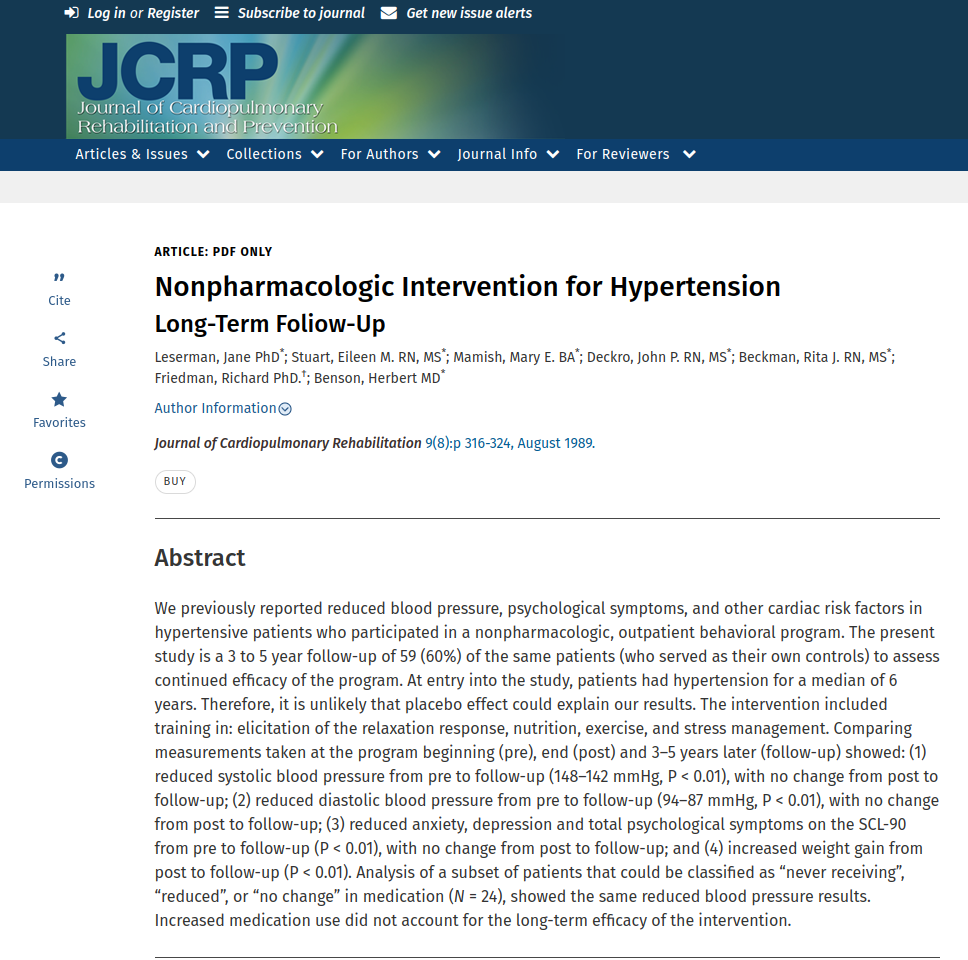We previously reported reduced blood pressure, psychological symptoms, and other cardiac risk factors in hypertensive patients who participated in a nonpharmacologic, outpatient behavioral program. The present study is a 3 to 5 year follow-up of 59 (60%) of the same patients (who served as their own controls) to assess continued efficacy of the program. At entry into the study, patients had hypertension for a median of 6 years. Therefore, it is unlikely that placebo effect could explain our results. The intervention included training in: elicitation of the relaxation response, nutrition, exercise, and stress management. Comparing measurements taken at the program beginning (pre), end (post) and 3–5 years later (follow-up) showed: (1) reduced systolic blood pressure from pre to follow-up (148–142 mmHg, P < 0.01), with no change from post to follow-up; (2) reduced diastolic blood pressure from pre to follow-up (94–87 mmHg, P < 0.01), with no change from post to follow-up; (3) reduced anxiety, depression and total psychological symptoms on the SCL-90 from pre to follow-up (P < 0.01), with no change from post to follow-up; and (4) increased weight gain from post to follow-up (P < 0.01). Analysis of a subset of patients that could be classified as “never receiving”, “reduced”, or “no change” in medication (N = 24), showed the same reduced blood pressure results. Increased medication use did not account for the long-term efficacy of the intervention.
Nonpharmacologic Intervention for Hypertension Long-Term Foliow-Up
Publication
Journal of Cardiopulmonary Rehabilitation
9(8):p 316-324
Abstract
Web and Email Links
Related Listings
Journal
Behavior Research and Therapy
In this study, Herbert Benson's (1975) Relaxation Response Meditation program was tested as a possible treatment for Irritable Bowel Syndrome (IBS). Participants were 16 adults who were matched into pairs based on presence of Axis I disorder, primary IBS symptoms and demographic features and randomized to either a six week meditation condition or a six week wait list symptom monitoring condition. Thirteen participants completed treatment and follow-up. All subjects assigned to the Wai […]
Journal
Radiology
Immediately before they underwent femoral angiography, 45 patients were given one of three types of audiotapes: a relaxation response tape recorded for this study, a tape of contemporary instrumental music, or a blank tape. All patients were instructed to listen to their audiotape during the entire angiographic procedure. Each audiotape was played through earphones. Radiologists were not told the group assignment or tape contents. The patients given the audiotape with instructions to […]
Journal
Scientific American
A very readable introduction to the scientific findings in neurology about primarily Buddhist forms of meditation.

